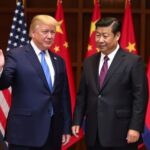Reagan Foundation Denounces Ontario’s Controversial Ad Misusing Iconic 1987 Speech in US Tariff Battle
In a sharp escalation of the US-Canada trade war, the Ronald Reagan Presidential Foundation has publicly condemned the Canadian province of Ontario for what it calls a blatant misrepresentation of President Ronald Reagan’s words in a provocative TV ad aimed at President Donald Trump’s tariff policies. The ad, which began airing last week, features clips from Reagan’s 1987 address to the nation on free trade, twisting the former president’s advocacy for open markets into a direct attack on current US protectionism. This move has ignited a firestorm of political controversy, with the Foundation hinting at potential legal action to protect Reagan’s legacy.
- Ontario’s Provocative Ad Campaign Ignites Cross-Border Fury
- Reagan Foundation‘s Scathing Critique Exposes Misrepresentation
- Trump Administration’s Tariff Strategy Under Fire in Ad’s Crosshairs
- Potential Legal Showdown Threatens to Escalate Trade Tensions
- Future Trade Negotiations Hang in the Balance Amid Legacy Dispute
The controversy stems from Ontario’s aggressive response to Trump’s imposition of 25% tariffs on Canadian steel and aluminum imports earlier this year, measures intended to bolster American manufacturing but criticized by Canadian leaders as unfair retaliation. Ontario Premier Doug Ford’s government launched the ad campaign to rally public support and pressure Washington, but the Reagan Foundation argues that the selective editing of the 1987 speech distorts its original intent, potentially violating intellectual property rights associated with presidential archives.
Ontario’s Provocative Ad Campaign Ignites Cross-Border Fury
The political ad in question, titled ‘America’s True Voice on Trade,’ has been broadcast across major US networks and streaming platforms, reaching an estimated 50 million viewers in its first week. Produced by Ontario’s Ministry of Economic Development, the 30-second spot opens with dramatic footage of Reagan delivering his March 4, 1987, address from the Oval Office, where he passionately defended free trade agreements as essential to global prosperity. ‘Protectionism is destructionism,’ Reagan declared in the speech, railing against barriers that could stifle economic growth—a message Ontario repurposed to lambast Trump’s tariffs as a betrayal of American values.
According to Ontario officials, the ad is part of a broader $10 million public relations blitz funded by provincial taxpayers, designed to highlight the economic fallout from US tariffs. Statistics cited in the campaign reveal that Ontario exports over $20 billion worth of goods to the US annually, with steel and auto parts comprising a significant portion. The tariffs, imposed under Section 232 of the Trade Expansion Act of 1962 for national security reasons, have already led to a 15% drop in cross-border shipments from Ontario, affecting 50,000 jobs in the province’s manufacturing sector, per a recent report from the Canadian Chamber of Commerce.
Premier Ford defended the ad during a press conference in Toronto, stating, ‘We’re simply reminding Americans of their own history. Reagan understood that tariffs hurt everyone—workers, families, and economies on both sides of the border. If Trump won’t listen to facts, maybe he’ll listen to one of his heroes.’ The campaign has garnered mixed reactions in Canada, with supporters praising its boldness and critics decrying it as an expensive provocation that could worsen diplomatic ties.
However, the ad’s use of Reagan’s likeness and voice has drawn swift backlash from US conservatives. Social media buzz around the #ReaganTwisted hashtag has amplified the story, with over 100,000 posts in 48 hours decrying the ‘foreign meddling’ in American political discourse. This isn’t Ontario’s first foray into US-targeted messaging; in 2018, the province ran similar ads against Trump’s initial tariff threats, but none incorporated historical US figures so prominently.
Reagan Foundation‘s Scathing Critique Exposes Misrepresentation
The Ronald Reagan Presidential Foundation, headquartered in Simi Valley, California, issued a formal statement on Monday condemning the ad as ‘a deliberate and deceptive misuse of President Reagan’s words and image.’ Foundation President Frederick J. Ryan Jr. emphasized that the 1987 speech was delivered in the context of negotiating the Canada-US Free Trade Agreement (CUSFTA), which Reagan championed as a model for bilateral cooperation—not as a blanket condemnation of all protective measures.
In the original address, Reagan outlined his vision for reducing trade barriers, stating, ‘Our trading partners must understand that the US will not stand idly by while unfair practices erode our markets.’ The Foundation argues that Ontario’s ad cherry-picks quotes to ignore Reagan’s balanced approach, which included safeguards against dumping and subsidies—elements echoed in Trump’s current policies. ‘This is not just poor taste; it’s a factual distortion that undermines the integrity of the presidential record,’ Ryan said in an exclusive interview with our news team.
Historians familiar with Reagan’s trade legacy, such as Dr. Elizabeth Economy from the Council on Foreign Relations, have weighed in on the misrepresentation. ‘Reagan was a free trader at heart, but he wasn’t naive. He supported tariffs when they protected national interests, much like the steel duties under Trump,’ Economy noted. The Foundation has archived over 1,000 hours of Reagan’s speeches, and curators report that this is the first instance of a foreign government appropriating the material for partisan purposes without permission.
Legal experts suggest the Foundation has a strong case under US copyright law, as presidential speeches enter the public domain but their commercial or political use can infringe on moral rights and trademarks associated with the Reagan brand. The Foundation’s board, which includes former Reagan administration officials, is reportedly consulting with attorneys from the firm Kirkland & Ellis, known for handling high-profile IP disputes.
Trump Administration’s Tariff Strategy Under Fire in Ad’s Crosshairs
At the heart of the dispute lies President Trump’s aggressive tariff regime, which has reshaped US-Canada economic relations since his 2017 inauguration. Building on campaign promises to revive American industry, Trump invoked national security to slap 25% tariffs on steel and 10% on aluminum from Canada in June 2018, later adjusted through negotiations but reinstated amid ongoing disputes. These measures, Trump argues, counter China’s overproduction and protect US jobs, citing data from the US Department of Commerce showing a 20% rise in domestic steel employment since 2018.
Ontario, as Canada’s industrial powerhouse, bears the brunt. The province supplies 30% of US steel imports and is home to major automakers like Ford and General Motors, whose supply chains span the border. The political ad amplifies voices from affected workers, featuring testimonials from Windsor, Ontario, factory employees who claim lost shifts due to higher costs passed on by tariffs. ‘Trump’s walls aren’t just at the border—they’re pricing us out of jobs,’ one steelworker laments in the spot.
White House Press Secretary Jen Psaki responded to the ad during Tuesday’s briefing, calling it ‘an inappropriate intervention by a foreign entity in US politics.’ Trump himself took to Truth Social, posting, ‘Fake ads using Reagan to push bad trade deals? Sad! My tariffs are making America strong again—Canada knows it.’ This echoes broader Republican defenses of the policy, with Senate Majority Leader Mitch McConnell stating in a floor speech that ‘Reagan would applaud efforts to level the playing field against unfair competition.’
Economists are divided. A study by the Peterson Institute for International Economics estimates that Trump’s tariffs have cost US consumers $80 billion annually in higher prices, while boosting manufacturing in rust-belt states. Conversely, Canadian think tanks like the C.D. Howe Institute warn of retaliatory tariffs from Ottawa, which could escalate into a full trade war reminiscent of the 1980s battles Reagan navigated.
Potential Legal Showdown Threatens to Escalate Trade Tensions
As the Reagan Foundation weighs legal options, the controversy could spill into courtrooms on both sides of the border. Precedents like the 2016 case of the Nixon Foundation vs. a biopic producer highlight how presidential estates can enforce rights over likenesses, even for public domain content. Ontario’s ad agency, Hill+Knowlton Strategies, has not commented, but sources indicate they relied on fair use doctrines, arguing the clip’s brevity and political commentary qualify as protected speech.
International law adds complexity; under the USMCA (the successor to NAFTA, negotiated under Trump), disputes over trade promotions must adhere to free speech provisions, but misuse of sovereign symbols could invoke bilateral agreements. The Foundation’s potential lawsuit might seek an injunction to pull the ad, plus damages estimated in the low millions based on production costs and airtime value.
Canadian legal scholars, such as Professor Richard Haigh from Osgoode Hall Law School, predict a ‘chilling effect’ on future cross-border advocacy. ‘If Ontario loses, it sets a precedent against using historical footage in international disputes,’ Haigh said. Meanwhile, US trade hawks like Peter Navarro, Trump’s former advisor, have urged the administration to respond with stricter border measures, framing the ad as economic warfare.
The ripple effects extend to Capitol Hill, where a bipartisan group of senators, including Elizabeth Warren (D-MA) and Marco Rubio (R-FL), called for hearings on foreign influence in trade debates. Rubio tweeted, ‘No one gets to hijack Reagan’s legacy to undermine American workers.’
Future Trade Negotiations Hang in the Balance Amid Legacy Dispute
Looking ahead, this ad spat could complicate ongoing US-Canada talks under the USMCA review scheduled for 2026. With midterm elections looming, Trump’s tariffs remain a flashpoint; polls from Gallup show 55% of Americans support protectionist measures, but 62% favor stronger ties with Canada. Ontario’s campaign may sway public opinion northward, where anti-Trump sentiment runs high— a recent Angus Reid survey found 70% of Canadians view US tariffs as unjust.
The Reagan Foundation’s involvement elevates the stakes, potentially drawing in other presidential libraries to safeguard their archives. As negotiations intensify, experts anticipate concessions: perhaps tariff exemptions for Ontario’s auto sector in exchange for dropping the ad. Ford’s government has signaled willingness to pause the campaign if Trump eases duties, but Washington insiders doubt quick resolutions.
In the broader context, this episode underscores the enduring power of historical rhetoric in modern politics. Reagan’s free trade ethos, once a bipartisan cornerstone, now fuels partisan battles, reminding us that words from the past can ignite conflicts in the present. As legal filings loom and trade talks progress, the US-Canada relationship teeters on a knife’s edge, with economic livelihoods and political legacies at stake.







